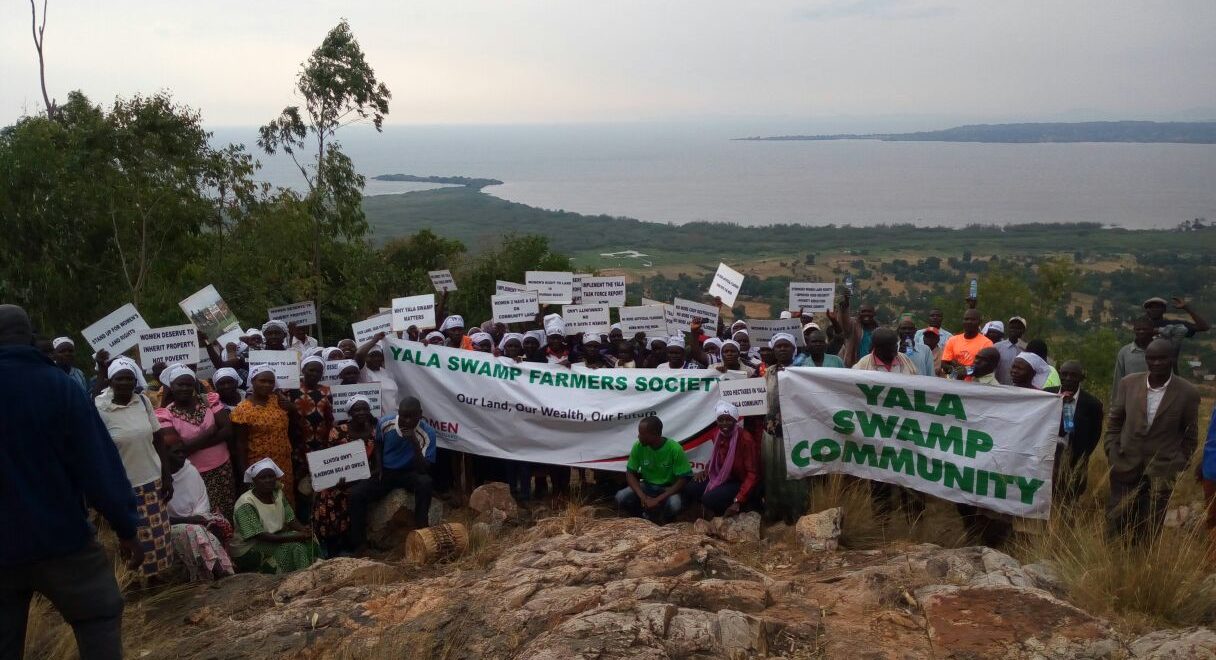Local communities, social movements and their allies have won some important victories recently to stop big land grabs around the world. Just last month people in Yala Swamp in Kenya, supported by ActionAid, won a court decision against Dominion Farms, a company from the United States, which has been grabbing their land since 2003.
The company had grabbed 6,900 hectares of land with the stated purpose of growing rice, but more recently generated new conflict by expanding into sugarcane production. However, in July, a Kenyan court issued an injunction ordering the company to restrict its operations to 3,700 hectares until a case filed by community members can be heard by the courts.
Before the Kenyan government gave the company permission to farm in Yala Swamp, these beautiful wetlands that feed the majestic Lake Victoria were used by local communities for farming, herding and fishing. Local people say that they were misled by company’s promises of development which have not materialized, and that the company has taken land, contaminated the wetlands with pesticides and built a dam that has caused farms and homes outside the project area to be flooded.
But Dominion Farms represents more than one land grab, the project was a model for the schemes and policies that the United States government, investors and allies in European and African Governments are trying to implement all over Africa.
In 2011, the World Economic Forum, an annual gathering of wealthy CEOs with global political leaders, founded the Grow Africa initiative, in which 12 African governments agreed to make changes to their national policies in order to receive large amounts of investment from international agriculture companies. Dominion Farms signed up, along with better known agribusiness conglomerates such as Cargill, Monsanto, DuPont, Syngenta, and Yara. Walmart joined too.
The Obama administration embraced the initiative and got the G8 (now G7) governments to launch the New Alliance to back Grow Africa in 2012, promising to bring in billions more in private investment in exchange for the policy commitments to support big agribusiness.
Dominion Farms promised to expand its operations in Africa with another 30,000 hectare rice farm in Nigeria. But attempts to grab land from a local community to set up the rice farm failed as local people led a wave of international protest before operations could get fully underway.
Civil society has spoken out against the New Alliance. More than 100 organizations signed a statement calling for its suspension in 2015, due to local farmers – the people who would be most affected – not being consulted as this policy was put together.
Former UN Rapporteur for the Right to Food, Olivier De Schutter, issued a sharply critical report on the New Alliance in 2016, citing land grabbing in Tanzania that was exposed by ActionAid, among many other issues. And in June of this year, the European Parliament passed a resolution decrying the risks and failures of the New Alliance. Parliamentarian Maria Heubuch stated “If the New Alliance does not address the severe problems that we witness, the EU should withdraw from the initiative.”
A year ago ActionAid supporters let the White House know that the New Alliance was posing a threat to poor communities rather than helping them. Since then, the New Alliance has become an embarrassment to Obama administration. I attended a symposium on food security in May held by USAID and the administration at the National Press Club and the New Alliance wasn’t even mentioned. In the latest White House press release extolling their global development legacy, the New Alliance is limited to one sentence, which merely mentions private sector commitments to invest – rather than actual investments.
The twin initiatives of the New Alliance and Grow Africa have diminished in visibility but they remain a threat to communities and small-scale farmers, many of whom are women. These initiatives are failing to invest in infrastructure and programs which will actually help communities and small-scale farmers. Instead, they are providing incentives for land-grabbing by both foreign companies and Africa’s urban elites.



